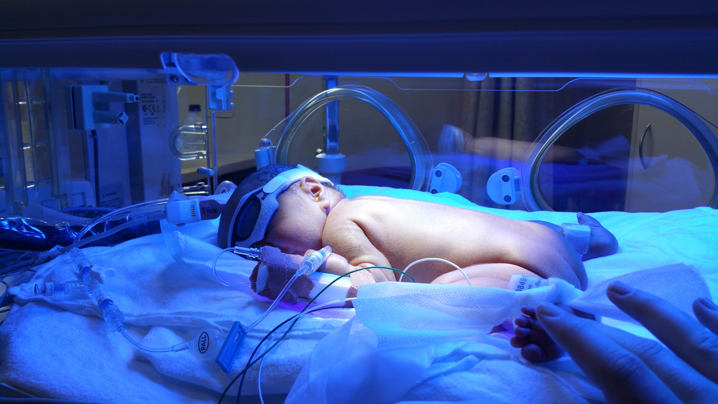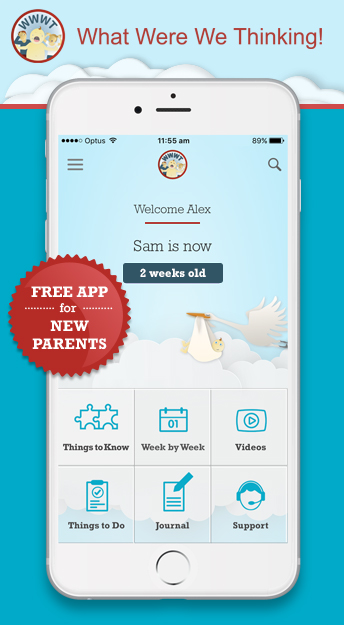Meeting my newborn at just 32 weeks
By Estelle

I’m a mother of two, so going into my second pregnancy I was a little blasé, you could say, with a “been there done that!" attutude I suppose I just assumed that having been through a fairly crappy pregnancy with my first baby, complete with morning sickness the entire time (resulting in broken ribs) and suspected whooping cough, that I had seen it all. Add to that sleepless nights for the first year of my first child’s life and you had me thinking I was well prepared for the next little cherub!
After a few complications that were picked up early on in my pregnancy, specialist appointments became somewhat of a routine and were the first real sign to this mumma that perhaps this journey with our second girl would be slightly more complex than the last.
At 28 weeks, the medical team that I was seeing decided I needed an intrauterine blood transfusion. I won’t bore you with the medical jargon but basically my bub was in desperate need of red blood cells and was becoming severely anaemic.
After going through the preparation for the transfusion, and being told by the head of the medical team that they only perform a handful a year and that there was a risk that I could go into spontaneous labour or lose the baby, I was pretty anxious.
At this point I was required to be monitored every few days and at 32 weeks, a late night decision on a Friday meant that bub was going arrive the next day! I naively assumed that she would be just a wee bit smaller then my first, who was full term, and I would be leaving the hospital with our new daughter as per our first. I was definitely wrong!
Baby No. 2’s arrival was a bit of a blur, not unlike many birth stories. My first memories, six hours after an emergency c-section, are of a serious looking paediatrician sitting beside my husband and I who explained that our beautiful new girl Violet – weighing in under 2kg – was in NICU (Neonatal Intensive Care Unit) and needed a full blood exchange. At this stage, I hadn’t even laid eyes on her.
Several hours later I recall my husband wheeling me into the NICU unit and seeing my precious baby laying completing naked in a humidicrib with lots of lines going into her stomach and being completely surrounded by UV lights for her jaundice. She was just adorable, and I still remember the feeling that just six hours prior she had been sharing her lifeline with me and now her lifeline was dependent upon the amazing nurses and specialists in the ward.
It was one of the weirdest days of my life leaving my newborn in hospital when I was discharged from three days later. It wasn’t until five days after her birth that I got to hold Violet, for whom I’d been expressing breastmilk around the clock for, for the very first time. It was a beautiful moment and I remember her being so tiny I could fit her in my bra!
When Violet was transferred to a special care unit at a hospital closer to home, things started getting difficult for me both physically and emotionally. I hadn’t realised the toll of not having my new baby at home with me, combined with balancing family life and the pressures I had put on myself as a mother. It was though the delicate bubble I had existed in until then was at breaking point. Between running into the hospital, trying to care for a toddler, pumping milk like a dairy cow and recovering from my C section, things were difficult.
The first of many crashing waves came three weeks after the hospital transfer. I recall sitting for the 100th time in the special care unit trying to force her tiny head and mouth on to my cracked nipple and just bursting into tears. I think they were tears for the loss of the ability to breastfeed, the pressure I had put on myself and mourning the loss of what I felt should have been a wonderful time enjoying my newborn at home.
For the next few months, after coming home from hospital, life with a premmie certainly presented challenges. She had trouble feeding and gaining weight, cried hysterically for hours on end and was unable to sleep due to constant pain from not bringing up wind. I felt life was certainly sending me a test with these issues continuing month after month. Quoting something my husband said, “maybe she just hates being a baby?”
Of course, like most other women, I really struggled to put my hand up and ask for help or accept the help of others. “I can do it all,” I thought. It was so hard to be positive with virtually zero hours of sleep and the constant worry about what Violet was going through.
I suppose I decided to write this blog post to tell the real truth about having a premmie, or any baby for that matter. Life can be hard. You will doubt yourself and you will feel unbelievable levels of guilt about everything from the best way to settle them, whether you should give them a dummy and whether it’s okay to let them cry it out in their cot.
What you must know is that you will be sleep deprived, you will suffer anger and jealousy at anyone who suggests that their baby is sleeping through the night at four months of age and you will feel slightly insane wiping tears off your cheeks for no apparent reason. But all this aside, you will totally and utterly never regret the journey you are on as a parent. Each day things may not feel like they’re getting any better but as a thousand people will tell you, they eventually do.
Now when I look into my adorable baby’s eyes, I can see her funny little personality shining through. I can now say that she “doesn’t hate being a baby” and I don’t mind being her mum – heck I love it.
Expert response from What Were We Thinking! expert, Heather Rowe
Most parents-to-be have pictures of what the birth of their baby will be like, holding their baby in their arms, going home from hospital, becoming a parent - all those special milestones that lie ahead. But most people who have experienced the birth of their baby and of themselves as parents, will tell you that the reality often brings unimagined challenges and emotions. Some of these unexpected experiences will be welcome and joyful, but others might feel like big losses that need to be acknowledged.
All parents experience unexpected losses when they have a baby, but the losses are bigger for some than for others. The premature birth of a baby is usually unexpected and, as Estelle movingly describes when meeting her daughter at 32 instead of 40 weeks gestation, she experienced the loss of her imagined joyful birth and homecoming for baby Violet.
Estelle’s story shows us how the rush of events: her anxiety leading up to the birth and the blur of activity and emotions surrounding it, the busy days and nights expressing milk for her baby in NICU, her own recovery from the caesarean section whilst caring for her older child, can mean a long delay before the reality and its emotional toll become apparent. Estelle recognised this for what it was and allowed herself to name and recognise her losses. She understood that it was OK to mourn these things: the long separation from newborn Violet, their inability to breastfeed, not being able to enjoy being with Violet at home. Naming the losses and experiencing the grief are important first steps towards adjusting to the new reality.
Many of us think that society expects a mother to be totally responsible for the care and welfare of her children. In this view, Estelle felt that ‘asking for help’ or accepting it was a sign of failure. But we can re-frame this by calling to mind the African proverb ‘it takes a village to raise a child’. This suggests that child-rearing is too much for two parents, let alone one and that others have a role to play. What if support for parents from others in the extended family and community were the norm rather than something to be asked for? What if people focussed as much attention on the new parents as on the baby’s arrival? Then there would be no need to feel ashamed, and all offers of help could be happily accepted. Alexandra’s comment reveals that Estelle’s story helped her to think differently about this too.
It was clear that Estelle was ‘keeping the baby in mind’ throughout, trying to see events from Violet’s perspective. This reminds us to think about how the baby is communicating her needs and that a parent’s task is to become expert about their baby. Estelle was able to keep a focus on the ‘big picture’ and know that life would become easier over time. The early months of a baby’s life can be challenging for any parent, but are especially so for the mother of a premature baby.
Posted in: A new reality Every baby is different Late pregnancy Mums Your needs








